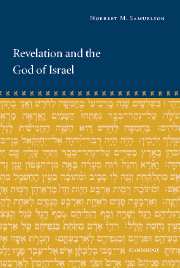Conclusion
Published online by Cambridge University Press: 22 September 2009
Summary
I have now concluded my philosophical-theological study of the concept of revelation from a Jewish perspective. Revelation is one of three foundational beliefs of Judaism. Together with the doctrines of creation and redemption, these three constitute dogmas of Jewish religious faith – dogmas in the sense that without them the only rationally viable interpretation of Jews choosing to be Jewish would be as an accidental fact of birth.
The first part of the book examined Jewish sources of philosophy and theology in order to formulate a best possible interpretation of what the concept of revelation means, where “best” means both (1) consistent with the totality of historical Jewish sources as well as contemporary Jewish religious life and practice, and (2) most worthy of assent by reasonable human beings who care that what they believe should be true, that is, be consistent with how they experience the world, other human beings, and God.
I looked at the Hebrew Scriptures themselves, classical Jewish philosophy, and modern Jewish theology. A full range of all of these sources was considered. However, the focus was more on some texts than others. Here the choices were made primarily on grounds that the texts chosen are “best” in the sense stated above, that is, most believable. In the case of the Hebrew Scriptures the focus was on the Pentateuch; in the case of classical Jewish philosophy the focus was on Maimonides' Guide of the Perplexed; and in the case of modern Jewish theology the focus was on Rosenzweig's The Star of Redemption.
- Type
- Chapter
- Information
- Revelation and the God of Israel , pp. 236 - 241Publisher: Cambridge University PressPrint publication year: 2002

